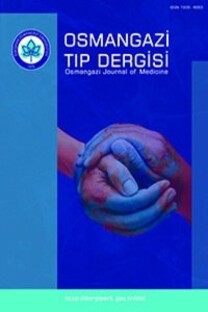Hem İmatinib Hem de Nilotinib Tedavisi altında Gelişen Grade 3-4 Cilt Döküntüsü, Tirozin Kinaz İnhibitörü Başlamadan Öngörülebilir mi? Olgu sunumu
cilt döküntüsü, tirozin kinaz inhibitörü
Both İmatinib and Nilotinib Treatment Associated Grade 3-4 Skin Rash, is it Predictable Before Tyrosine Kinase Inhibitor Treatment? A Case Report
skin rash, tyrosine kinase inhibitor,
___
- 1.Faderl S, Talpaz M, Estrov Z, et al. 1999. The biology of chronic myeloid leukemia. N Engl J Med, 341:164– 72.
- 2.Kantarjian H, Giles F, Wunderle L, et al. 2006. Nilotinib in imatinib-resistant CML and philadelphia chromosome – positive ALL. N Engl J Med, 354:2542–51.
- 3.Giles, F.J, Abruzzese, E, Rosti, G, et al. 2010. Nilotinib is active in chronic and accelerated phase chronic myeloid leukemia following failure of imatinib and dasatinib therapy. Leukemia 24, 1299–1301.
- 4.Schwab C. 2006. Advances in the management of chronic myeloid leukemia with Abl kinase inhibitors. Oncology Briefings, 4:1–3.
- 5.Package insert. Tasigna (nilotinib). East Hanover, NJ: Novartis Pharmaceuticals; 2010.
- 6.Mauro MJ, Deininger MW. Management of drug toxicities in chronic myeloid leukaemia.Best Pract Res Clin Haematol. 2009;22:409–429.
- 7.Kantarjian HM, Giles F, Hochhaus A, et al. Nilotinib in patients with imatinib-resistant or -intolerant chronic myelogenous leukemia in chronic phase (CML-CP): Updated Phase II results. J Clin Oncol. 2008 126:7010.
- 8.Quintas-Cardama A, Kantarjian H, O’Brien S, et al. Pleural effusion in patients with chronic myelogenous leukemia treated with dasatinib after imatinib failure. J Clin Oncol. 2007;25:3908–3914.
- 9.Bolognia JL MD, Jorizzo JL, Schaffer JV. Drug Reactions. Dermatology. 2012;21,335-356
- 10.Natali P.G, Nicotra M.R, Sures I, et al. 1992. Expression of c-kit receptor in normal and transformed human nonlymphoid tissues. Cancer Res. 52, 6139–6143.
- 11.El-Agamy D.S. 2012. Anti-allergic effects of nilotinib on mast cell mediated anaphylaxis like reactions. Eur J Pharmacol. 2012 Apr 5 ;680(1-3):115-21.
- 12.Kantarjian H.M, Giles F.J, Bhalla K.N, et al. 2011. Nilotinib is effective in patients with chronic myeloid leukemia in chronic phase after imatinib resistance or intolerance: 24-month follow-up results. Blood. 2011 Jan 27;117(4):1141-5.
- 13.Rosti G, Palandri F, Castagnetti F, Breccia M, Levato L, Gugliotta G, Capucci A, Cedrone M, Fava C, Intermesoli T, Cambrin GR, Stagno F, Tiribelli M, Amabile M, Luatti S, Poerio A, Soverini S, Testoni N, Martinelli G, Alimena G, Pane F, Saglio G, Baccarani M; GIMEMA CML Working Party.Nilotinib for the frontline treatment of Ph_ chronic myeloid leukemia. Blood. 2009 Dec 3;114(24):4933-8.
- 14.Nicolini FE, Turkina A, Shen ZX, Gallagher N, Jootar S, Powell BL, De Souza C, Zheng M, Szczudlo T, le Coutre P. Expanding Nilotinib Access in Clinical Trials (ENACT): an open-label, multicenter study of oral nilotinib in adult patients with imatinib-resistant or imatinib-intolerant Philadelphia chromosome-positive chronic myeloid leukemia in the chronic phase. Cancer. 2012 Jan 1;118(1):118-26.
- 15.Guilhot F.2004. Indications for imatinib mesylate therapy and clinical management. Oncologist, 9:271-81.
- ISSN: 1305-4953
- Yayın Aralığı: Yılda 6 Sayı
- Başlangıç: 2013
- Yayıncı: Eskişehir Osmangazi Üniversitesi Rektörlüğü
Mevlüt TÜRE, İmran KURT ÖMÜRLÜ
Kompleks İliak Arter Anevrizmalarında Çok Katmanlı Akış Modülatörü Kullanımı
İzole sfenoid sinüs patolojileri: 7 olgunun retrospektif analizi
Alper DİLCİ, Ömer BİLAÇ, Ersem GİRİTLİ
DÖNDÜ ÜSKÜDAR CANSU, Hava ÜSKÜDAR TEKE, CENGİZ KORKMAZ
Endoskopik Retrograt Kolanjiopankreatografi Sonrası Gelişen Bilateral Pnömotoraks: Olgu Sunumu
Bartu BADAK, Arda Şakir YILMAZ
Betül AYDIN BUYRUK, Özden ALTUNDAĞ
Endoskopik Retrograt Kolanjiopankreatografi Sonrası Gelişen Bilateral Pnömotoraks Olgu Sunumu
Bartu BADAK, Arda Şakir YILMAZ
Dış Ve Orta Kulak Malformasyonlarına Yaklaşımda Klasik Ve Yeni Uygulamalar
Ülseratif kolitle ilişkili dirençli pyoderma gangrenosum tedavisinde certolizumab pegol deneyimi
